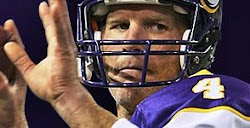I've been talking to a number of friends and family about the Brett Favre/Green Bay Packer situation and, I have to tell you, emotions are running high. Apparently it's 50/50 in Wisconsin - those siding with Brett or the Packers. Probably closer to 90/10 in favor of Brett in Green Bay. Friends and family are split, though more in favor of Brett. However, it's not a dislike for Favre as a person or player that separates the camps, more related to Brett's handling of the situation (or the Packers' handling of the situation). Oddly enough, my friends who root for other teams are on the Brett side: Donovan & Maria & Baby Grace in Tujunga, Cali (Bronco fans) = Brett. Nick in Cedar Rapids (Cowboys) = Brett. Bill the FedEx guy at work (49ers) = Brett. Robert at work (Chargers) = Brett. John in Philly (Eagles - though I haven't talked to him yet, I know) = Brett. No matter what people's stance on the subject, this is an unbelievable situation we find ourselves in that is reminiscent of the "worlds collide" theory set forth in "Ghostbusters" ('Human sacrifice, dogs and cats living together... mass hysteria!').
So my best friend, Tom Kazar, calls me this morning en route to a wedding reception in Manitowoc, Wisconsin, and he tells me that back in January, after the Packers' loss to the Giants in the NFC Championship, he called WTMJ in Milwaukee to chime in on whether or not Brett will return to the Packers for a 17th season. Tom gets on the air and states (paraphrasing), "Favre is a tragic hero. This situation - Favre's future with the Packers - can ONLY result in tragedy."
Why he thought that at the time I do not know. But if you take into consideration everything that's happened in Brett's life - car accident while at Southern Mississippi, his father's death, his grandmother's death, his brother-in-law's death, his wife's breast cancer, his childhood home swept away during Hurricane Katrina, various injuries - and all the drama associated with "will he or won't he retire", Brett Favre is certainly a tragic hero. An astute call, my friend.
 © Copyright 2007 Janis Mertin
© Copyright 2007 Janis MertinAs an actor, I'm familiar with the
tragic hero character in literature and theater. Aristotle once said that
"A man cannot become a hero until he can see the root of his own downfall." An Aristotelian tragic hero must possess specific characteristics, included below:
1) Nobility or wisdom.
2) A reversal of fortune. The discovery or recognition that the reversal was brought about by the hero's own actions. The audience must feel pity and fear (fear that it could have been them) (catharsis) for the character.
3) Initially, the tragic hero should be neither better nor worse morally than normal people, in order to allow the audience to identify with him.
4) This also introduces pity, which is crucial in tragedy, for if the hero were perfect we would either be outraged with his fate or not especially care due to his ideological superiority. Eventually the Aristotelian tragic hero dies a tragic death, having fallen from great heights and having made an irreversible mistake.
5) The
hero must courageously accept his or her death with honor.
Other common traits characteristic of a tragic hero: The hero is led to his downfall due to hubris, or excessive pride.
The hero must be doomed from the start, but bears no responsibility for possessing his flaw.
The hero must have discovered his fate by his own actions, not by things happening to him.
The hero must see and understand his doom, and that his fate was revealed by his own actions.
The hero's story should arouse fear and empathy.
The hero must be intelligent enough to have the opportunity to learn from his mistakes.
The hero must be faced with a very serious decision.
The suffering of the hero must have meaning.
Certainly, much of this can be attributed to Brett Favre. And certainly, much of this can be attributed to the Green Bay Packer organization and GM Ted Thompson. There's also another definition that goes hand-in-hand with this subject - that of tragic virtue, which is an alternative view of the tragic hero, especially in Renaissance British literature, one in which he or she possesses a tragic virtue. In this paradigm the hero exhibits traits that would under other conditions be considered desirable but due to external circumstances cause their eventual undoing. For example, Shakespeare's character Hamlet is often criticized for his contemplative nature. Hamlet's failure to act is cited as his tragic flaw.
Whether you're a Packer fan, a Favre fan, an NFL fan or a sports fan, you can see the relevance of the tragic hero in the Brett Favre/Packers clusterfuck. Perhaps instead of jumping down Favre's throat for being egotistical, controlling and waffling on his retirement (all characteristics that can be attributed to the Packer organization as well), you can begin to see that it's not so much an issue of laying blame as it is a result of Brett Favre just being Brett Favre - and everything that goes along with being one of the most prolific players/QB's in the history of the NFL, for one of the most storied franchises in the NFL. I think of myself as a person whose judge of character is almost flawless; and, though Favre may, in fact, be a tragic character, I will choose to have him, warts and flaws in all, in my corner 100% of the time.
The Packer organization should feel the same.

















No comments:
Post a Comment